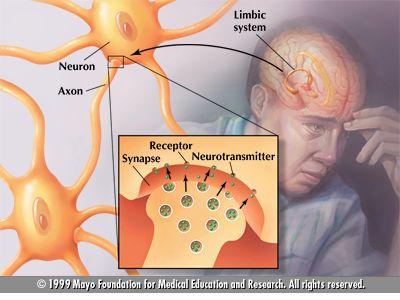

Depression is NOT a moral failing, a character flaw or weakness, or any other such thing. It is an illness. And like any other illness, it can take its toll. Depressive illnesses are biological, illnesses related to imbalanced or disrupted brain chemistry. The brain is an organ of the body and can get "sick" just like the heart, liver or kidneys. People with depression and other depressive illnesses have a disease that requires diagnosis and treatment from a doctor.People with depressive illnesses cannot talk themselves into feeling good or out of feeling bad. They cannot snap themselves out of it. Many times, society assumes people suffering from depression are just lazy or lack motivation to get their lives together. People with depression are often labeled as having a behavior or attitude problem.
Life is not always easy, and sometimes it's difficult
to smile when the dark clouds move in to block the sun.
But you must have faith that things will get better.
Reach inside and draw on your strength and hope.
It's still there, waiting to see you through this difficult
time. The night may seem long, but think of all
the possibilities that the dawn might hold.
And in the end, you'll be a stronger person from this,
Symptoms of Depression for Adolescents and Adults
Depression (Misc.)
Over 60 percent of all people who die by suicide suffer from major depression. If one includes alcoholics who are depressed, this figure rises to over 75 percent.
Depression affects nearly 10 percent of Americans ages 18 and over in a given year, or more than 24 million people.
More Americans suffer from depression than coronary heart disease (17 million), cancer (12 million) and HIV/AIDS (1 million).
About 15 percent of the population will suffer from clinical depression at some time during their lifetime. Thirty percent of all clinically depressed patients attempt suicide; half of them ultimately die by suicide.
Depression is among the most treatable of psychiatric illnesses. Between 80 percent and 90 percent of people with depression respond positively to treatment, and almost all patients gain some relief from their symptoms. But first, depression has to be recognized.
It's not known exactly what causes depression. As with many mental illnesses, it appears a variety of factors may be involved. These include: 1) Biological differences. People with depression appear to have physical changes in their brains. The significance of these changes is still uncertain, but may eventually help pinpoint causes.
This is simply not true.
and you'll be so proud that you made it.
Mental Health Conditions - Great Information from NAMI
21 Tips to Keep Your Sh*t Together When You’re Depressed.
Depression And Suicide: Someone Intervene!
3 Minute Depression Test
2) Neurotransmitters. These naturally occurring brain chemicals linked to mood are thought to play a direct role in depression.
3) Hormones. Changes in the body's balance of hormones may be involved in causing or triggering depression. Hormone changes can result from thyroid problems, menopause or a number of other conditions.
4) Inherited traits. Depression is more common in people whose biological family members also have this condition. Researchers are trying to find genes that may be involved in causing depression.
5) Life events. Certain events, such as the death or loss of a loved one, financial problems, and high stress, can trigger depression in some people.
6) Early childhood trauma. Traumatic events during childhood, such as abuse or loss of a parent, may cause permanent changes in the brain that make you more susceptible to depression.

| Imbalances in neurotransmitter levels are thought to play a role in depression. Neurotransmitters are the chemical messengers that enable nerve cells (neurons) to communicate. They're released into the gaps (synapses) between nerve cells to help nerve messages flow from one cell to another. If neurons don't produce enough of these chemicals, nerve messages aren't communicated, and areas of your brain may not receive stimulation. Lack of stimulation to your brain's limbic system and hypothalamus, areas that control mood and emotion, may reduce activity in these areas and result in depression. 
"The last great stigma of the twentieth century
is the stigma of mental illness." |